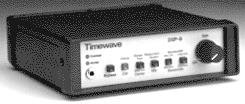|
|
|
|
Discontinued Product
 |
Reduce noise and interference - Adaptive noise filter for SSB and AM Eliminate heterodynes - Automatic multiple tone noise filter - AGC (Automatic Gain Control) Sharp Speech and CW - Linear phase FIR filters - 1.8, 2.4 and 3.1 kHz. Bandpass - 100, 200 and 500 Hz. Bandpass Built-in Self-Test |
NOISE REDUCTION
The noise reduction functions of
the DSP-9 operate by examining a characteristic of signals and noise called
correlation, and dynamically filtering out the undesired noise. The degree of
correlation is relative. Random noise such as white noise or static is
uncorrelated. Speech is moderately correlated. Heterodynes and pure tones are
highly correlated. The DSP-9 measures correlation and automatically filters
out noise that is outside its correlation thresholds. The amount of noise
reduction varies according to the correlation characteristics of the noise.
Typical noise reduction ranges from 5 dB to 20 dB for random noise and up to 50
dB for heterodynes.
BANDPASS FILTERS
Narrow band signals like CW require
bandpass filters with steep skirts and linear phase response. Linear phase
response maximizes the usable signaling rate for a given bandwidth and
minimizes ringing often heard on other types of extremely sharp filters. The
filter skirts on the CW filters are so steep that a signal literally falls off
the edge of the passband as you tune through a CW signal. The narrow filters are
useful for trying to dig out extremely weak signals from the noise and QRM.
The wider filters allow easy tuning and listening to multiple CW signals
simultaneously. SSB signals often have a high signal-to-noise ratio but have
interference from other signals that overlap the desired signal. The steep
skirts of the speech bandpass filters allow the interference to be eliminated
with minimal impact on the desired signal.
EASY OPERATION
Front panel pushbutton switches enable
quick, independent selection of all the functions on the DSP-9. In the voice
mode, the operator can simultaneously select a bandpass filter, the tone notch
filter and the random noise reduction filter. This means you can reduce QRN,
filter adjacent-channel QRM, and eliminate heterodynes at the same time! In the
CW mode, simultaneous selection of both the random noise reduction filter and a
bandpass filter reduces background hiss as well as adjacent-channel signals.
AGC (Automatic Gain Control) is on when the Tone button is pushed. It works only
when in the voice mode. In this setting, both the Tone and AGC function at the
same time.
SIMPLE INSTALLATION
The DSP-9 is compatible with all
amateur radio transceivers and receivers. Simply connect the DSP-9 between the
radio and its speaker or headphones. Connect 12-16 VDC to the DSP-9 and turn
it on!
AUDIO INPUT
| Impedance | 2K ohms or 22 Ohms, jumper selectable |
AUDIO OUTPUT
| Output power | 1.6 watts into 8 ohms at 13.8 VDC, 2.5 watts into 4 ohms at 13.8 VDC |
| Distortion | less than 1% at rated output |
VOICE FILTERS
| Function | Frequency range | Attenuation | Type | Delay |
| Random Noise Reduction | Entire range of selected bandpass filter |
Up to 20 dB, varies with noise characteristics |
Adaptive | 5 msec max |
| Tone Noise Reduction (multiple automatic notch) |
Entire freq. range of selected bandpass filter |
Up to 60 dB, varies with noise characteristics |
Adaptive | 5 msec max |
| Bandpass - Voice | 300 Hz - 3.4 kHz, 300 Hz - 2.7 kHz and 300 Hz - 2.1 kHz or (jumper selectable) 300 Hz - 2.7 kHz, 300 Hz - 2.3 kHz and 300 Hz - 1.9 kHz |
60 dB at 180 Hz outside the passband |
FIR Linear phase |
10 msec max |
CW FILTERS
| Function | Frequency range | Attenuation | Type | Delay |
| Bandpass - CW | Bandwidth = 100 Hz, 200 Hz and 500 Hz Center freq. = 400/500 Hz or 600/750 Hz (jumper selectable) |
60 dB at 50 Hz outside the passband |
FIR Linear phase |
30 msec max |
| Random Noise Reduction |
Entire freq. range of selected bandpass filter |
Up to 20 dB, varies with noise characteristics |
Adaptive | 5 msec max |
CONTROLS
| Volume / Power On-Off | Voice / CW Bandpass bandwidth switch |
| Voice / CW Mode switch | CW center frequency switch |
| Bypass switch | Overload LED |
| Random Noise Reduction switch | Normal LED |
| Tone Noise Reduction switch |
| Audio Input | Phono jack - RCA style |
| Speaker Audio Output | Phono jack - RCA style |
| Power In | 5.5 mm / 2.1 mm power jack (center positive) |
SIGNAL PROCESSING
| A-D/D-A Converter | 16 bit linear, sigma-delta conversion |
| Signal Processor | 16 bit, 77ns Analog Devices ADSP-2105 |
TEST MODE
| Self-test | Self-test for circuitry and switches. User initiated from front panel. |
DIMENSIONS
| Size | 5.9 in. wide x 6.7 in. deep x 1.9 in. high (150 mm wide x 170 mm deep x 48 mm high) |
| Weight | 2.0 lb. (0.9 Kg.) |
POWER
| 12-16 VDC @ 1A |
|
|
| © 2007-2022 Timewave Technology, Inc. All Rights Reserved. |